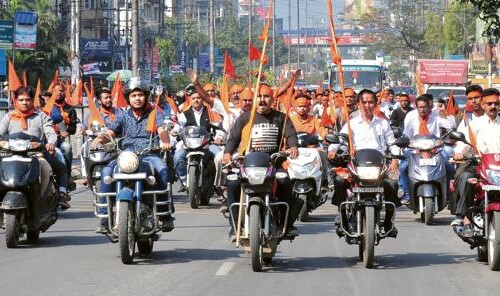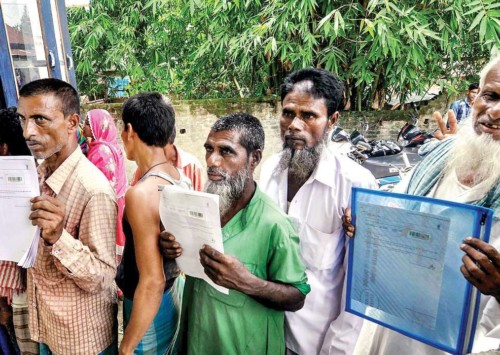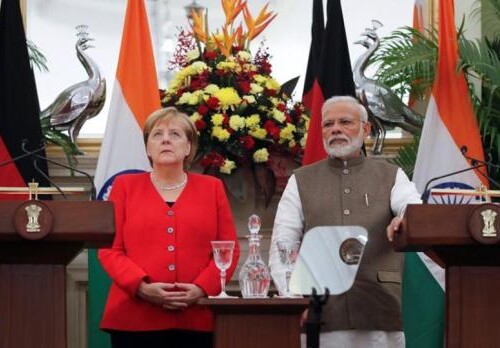Ayodhya case: Apex court rules in favour of Hindus
The verdict for the historic Ayodhya-Babri Masjid dispute was delivered today where the dispute site was alloted to Ram Janmabhoomi Nyas, while the government was directed to allot an alternate five acre land to Sunni Waqf Board for mosque within Ayodhya.
It is not very often that the Chief Justice of India (CJI) along with his brother judges holds confabulations with a province’s top most bureaucrat and police chief before delivering a critical judgment.
Unprecedentedly on Friday, CJI Ranjan Gogoi at the Supreme Court did just that, triggering an avalanche of speculation, which has turned out to be correct.
The Supreme Court on Saturday awarded a bitterly disputed religious site to Hindus, dealing a defeat to Muslims who also claim the land. This 70-year-old dispute has sparked some of the bloodiest riots in the history of independent India and even earlier.
The ruling in the dispute between Hindu and Muslim groups paves the way for the construction of a Hindu temple on the site in Ayodhya, a long-standing proposal supported by Prime Minister Narendra Modi’s ruling BJP.
The court came up with some points that have until now been regarded as contentious. It ruled that the Babri Masjid was not built on vacant land and the underlying structure was not an Islamic one.
Significantly, it said that the Archaeological Survey of India (ASI) had established that there lay a temple beneath the destroyed structure and said that to describe the ASI’s view as merely an `opinion’, would be to do disservice to the organisation.
The Court ruled that both the Hindus and Muslims believed that the disputed place is the birthplace of Lord Rama.
It further said that the existence of Sita Rasoi (Sita’s kitchen), Ram Chabutra (terrace of Rama) and Bhandar griha (store house) are the testimony of the religious fact of the place.
While the UP Sunni Waqf board had failed to establish its case in the Ayodhya dispute, the Hindus had established their case that they were in possession of the outer courtyard, the court ruled.
The Supreme Court asked the Centre to frame a scheme within three months and set up a trust for construction of a temple. The possession of the disputed 2.77 acre will rest with the central government receiver.
The Allahabad High Court had in a 2010 judgment ordered that the disputed 2.77 acre land in Ayodhya be divided equally among three parties – the Nirmohi Akhara, Ram Lalla and the Sunni Waqf Board. This verdict was challenged in the Supreme Court.
In 1992 a mob destroyed the 16th-century Babri Mosque on the site, triggering riots in which about 2,000 people, most of them Muslims, were killed across the country. Court battles over the ownership of the site followed. According to a CBI chargesheet filed later, most, if not all, members involved in the act belonged to the larger Sangh brotherhood.
Jubilant Hindus, who have long campaigned for a temple to be built on the ruins of the mosque, set off fire crackers in celebration in Ayodhya after the court’s decision was announced.
Representatives of the Muslim group involved in the case criticised the judgment as unfair and said it was likely to seek a review of the verdict.
Thousands of paramilitary force members and police were deployed in Ayodhya and other sensitive areas across India. There were no immediate reports of unrest.
The Indian Prime Minister himself led appeals for calm. “This verdict shouldn’t be seen as a win or loss for anybody,” Modi said on Twitter, adding “May peace and harmony prevail!”
But look at it any way, the verdict is likely to be viewed as win for the BJP and its supporters.
However, for some observers like Neelanjan Sircar, an assistant professor at Ashoka University near New Delhi, the court ruling would benefit the BJP in the short run, but a slowing economy would ultimately take centre stage for voters. “The Ram Temple isn’t going to put food on the table,” he was quoted saying by a news agency.
Hindus widely believe the site is the birthplace of Lord Ram, and say the site was holy for Hindus long before the Mughals, India’s most prominent Islamic rulers, built the Babri mosque there in 1528.
The five-judge bench, headed by CJI Gogoi, reached a unanimous judgement to hand over the plot of just 2.77 acres (1.1 hectares), to the Hindu group.
The court also directed that another plot of five acres (two hectares) in Ayodhya be provided to the Muslim group that contested the case, but that was not enough to mollify some.
Asaduddin Owaisi, an influential Muslim opposition politician, told reporters that the “The country is now moving towards becoming a Hindu nation,” even as Modi’s BJP hailed the ruling as a “milestone”.
“I welcome the court decision and appeal to all religious groups to accept the decision,” federal home Minister Amit Shah, who is also president of the BJP and the second-most important man in the Indian government, said on Twitter.
The Sunni Muslim group involved in the case said it would likely file a review petition, which could trigger another protracted legal battle. “This is not justice,” the group’s lawyer, Zafaryab Jilani, told reporters.
In a remarkable display of sobriety, however, the main groups involved in the lengthy litigation pleaded for maintaining peace. Muslim organisations appealed for calm, while the Hindu group led by the Rashtriya Swayamsevak Sangh – BJP’s parent organisation – had already decided against any celebrations to avoid provoking sectarian violence between India’s majority Hindus and Muslims, who constitute 14 pc of its 1.3 billion people.
Restrictions were placed on gatherings in some places and internet services were suspended. Elsewhere, police monitored social media to curb rumours.
Streets in Ayodhya were mostly deserted and security personnel patrolled the main road to Lucknow, the capital of the politically crucial northern state of Uttar Pradesh, also the site of the disputed structure.
Ayodhya residents were glued to their televisions and mobile phones for news of the ruling, which delighted the majority Hindu community.













